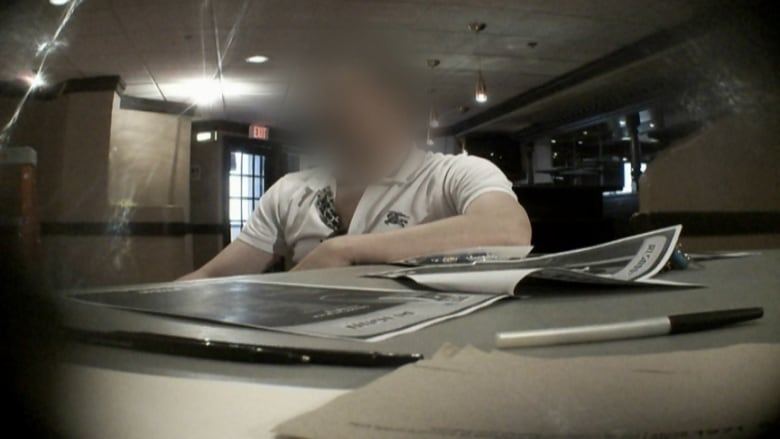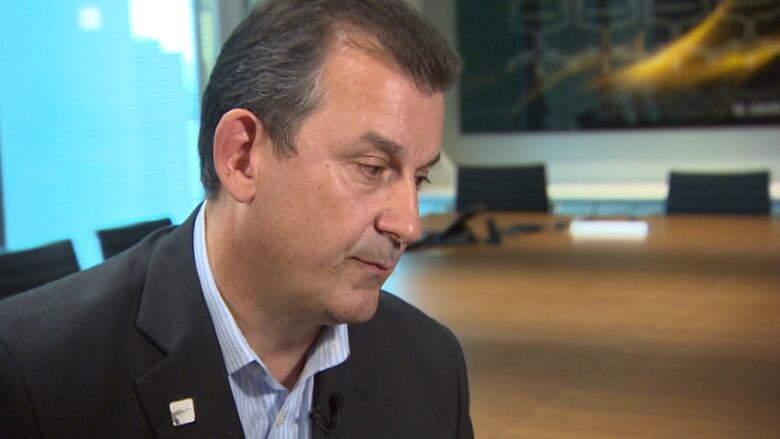Private ATMs vulnerable to money-laundering
Undercover video captures cash-machine vendors explaining how to evade controls
A CBC/Radio-Canada investigation has uncovered methods organized crime may be using to launder money through privately owned automated tellers, or ATMs.
There are almost 38,000 of the ATMs, also known as "white label" cash machines because they are not bank-owned, scattered across the country — nearly double the number of bank-owned ATMs.
It is a growing, lucrative industry. Placed in hotel lobbies, bars and food courts, they provide quick access to cash, albeit with an annoying surcharge.

But experts believe some machines may have a more nefarious role.
"Investigations have shown over the years that these white-label ATM machines are in every strip club, every bar throughout Canada," said Garry Clement, an international authority on money laundering and retired RCMP officer who has been warning about the vulnerability of ATMs. "And a lot of them (ATMs) are affiliated with organized crime groups, in particular the Hells Angels or other motorcycle gang groups which are known as organized crime."
Clement told CBC News organized crime can circumvent industry safeguards by "comingling" legitimate business money and illicit money through the machines so that it gets "cleaned up."
For example, the Hells Angels could arrange to have an ATM placed in a strip club. The owner of the club — a front person chosen for their lack of criminal record — would apply for the necessary security clearance and, after receiving it, could stock the machine with a mix of bar proceeds and, say, drug proceeds. As long as the machine stayed under a safe limit, say $5,000 a day, it would be unlikely to draw attention, according to Clement.
That kind of scenario is classic money laundering, he said. "It's a great way to take it from a cash-based system and gets it into a business-based system, because it is now in the financial system."
At least $315M a year possibly laundered: report
There are no hard statistics for how often this might be happening, but one RCMP report estimates Hells Angels bikers control at least five per cent of the private ATM business in Canada. The same report says at least $315 million a year could be laundered through white-label ATMs.
Tips
If you have any tips to share on this or any other investigative story, please email [email protected].
Very few charges have been laid or convictions obtained because authorities who uncover money laundering are more interested in the illegal activity that generated the crime proceeds. A verdict is expected early next year in a case in Quebec, where police charged three people in 2008 with using ATMs to money launder the proceeds from cigarette smuggling.
The government had been cautioned about these problems before. In 2007, FINTRAC, the federal agency that collects and analyzes records of financial transactions, delivered a report warning that white-label ATMs were at risk. The report said, "One feature that makes white-label ATMs particularly vulnerable to money laundering is the fact that operators can remain virtually anonymous while conducting their activities. This is mainly due to the number of tiers in the ATM ownership hierarchy. As white-label ATMs are sold and re-sold to different parties, the change in ownership is not always reported to the upper tiers of the hierarchy."
Despite the report, there is no direct or official government oversight of the ATM industry.
- In depth: How dirty money gets clean
In 2009, new rules aimed at making it harder for criminals to acquire ATMs were brought in by INTERAC, the association responsible for the network that connects bank machines in the country. The new rules spell out basic guidelines requiring potential buyers to be clearly identified, to not have a criminal record (although criminal background checks are not done for every case), and to spell out the source of funds they plan to use to stock the machine.
Clement said the rules can be easily thwarted, however. "Unless you are sitting there showing exactly where that money came from, there is no way that anybody can say it was not mixed with both licit and illicit income."
Hidden camera
To test the regulations, CBC News and Radio-Canada's investigative program Enquête went undercover, each hiring someone to pose as a man interested in purchasing a white-label ATM.
The undercover buyer CBC hired hinted he had a criminal record for fraud and wanted to use the machines for illegal purposes. He spoke with seven ATM vendors.

Time and time again he was informed the rules could be circumvented.
"They're not doing any background checks," he was told by one seller. Several others expressed the same idea.
Twice he was assured that, if he incorporated as a business, he could avoid background checks.
"It is not illegal to own a company and have a criminal record. I mean it is nothing," he was told.
Another time he was told, "There is a stupid form you need to fill in called anti-money-laundering. But that's nothing."
CBC News took the findings to Mark Sullivan, the director of fraud programs at INTERAC. After watching some of the undercover video, Sullivan said, "Obviously this sort of behaviour is abhorrent to us. It's totally unacceptable."

Sullivan argued that despite what the salesmen said, he believed the rules would prevent any criminal from accessing the ATM banking network.
"The reality between saying you're able to do something and physically being able to connect to the system are somewhat different."
INTERAC works closely with law enforcement domestically and internationally and is constantly on the lookout for potential criminal activity, Sullivan added.
Former RCMP officer Clement said it is not enough to let the industry police itself. He said he would like to see more government involvement, such as the recent steps by the province of Quebec to take more control of the industry. Otherwise, Clement warned, "wherever there's a gap, [criminals] are going to use it."
If you have any tips to share on this or any other investigative story, please email [email protected].
2007 FINTRAC report into risks of white-label ATMs:
With files from CBC's Joseph Loiero and Sophia Harris
